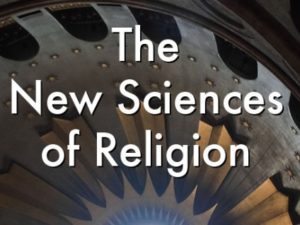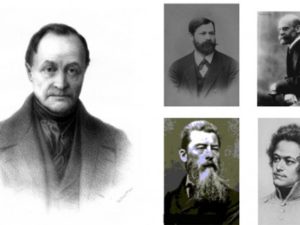NSoR 9: God-by-Whatever-Name

An excerpt from Chapter 9 of The New Sciences of Religion: Exploring Spirituality from the Outside In and Bottom Up (Palgrave Macmillan, 2010) Pages 190 – 193.
Why talk about God at all, many scientifically minded atheists are inclined to ask? We cannot define God in any rigorous way. Indeed, God-talk is primarily the domain of antiscientific and superstitious supernaturalists, we are told. Many today have an almost allergic reaction to the very word “god.” Many others use and misuse the name of God in ways that would certainly justify this negative assessment.
Of course, one of the reasons we need to talk about God is that we propose to study religion scientifically. Religion is an important phenomenon. Religious people talk a lot about God or God-concepts. How can we conduct a science of religion that ignores the central claims of the subjects, a claim made with subjective certainty?
An adequate science of religion needs to develop a phenomenology of God-talk, and this can be separated from the question of whether God exists. The scientific study of religious and spiritual phenomena cannot, as a matter of philosophy, and should not, as a matter of science, be motivated by a desire to prove or disprove the existence of God. The philosophical debate was settled by our medieval ancestors in the form of apophatic theology, which argues that any positive assertion about the character and nature of God is necessarily untrue because “the eternal” and “transcendent” cannot be described by finite human minds with our finite human languages. Apophatic theology is the Via Negativa of Christianity, the En Soph of Judaism, the bila kaif of Islam, the neti neti of Hinduism, and the sunyata of Buddhism. Under the influence of postmodern philosophy, apophatic theology has made a comeback among thoughtful theologians today. Any “God” that could be discovered or disproved by science simply would not be God. The apophatic God of philosophical theology provides an important point of departure and also a warning. The theologian John Bowker writes:
It is true that God is not an object like a universe, or an object in a universe, to be explored and investigated by apparatus and experiments. But it is equally true that God does not depend for his existence or nature on our opinions or concepts about him, and that his reality does set limits on our language about him. . . . A real cause for alarm would be if theology could provide a complete and realistic representation of God, because any such literally accurate “model” of God would be an idol.1
How, then, is God-by-whatever-name to be apprehended? What are the data for and feedback from this God-by-whatever-name that lead humans to conclude that such a transcendent divine force and mind lies beneath, within, and beyond the universe in which we think, live, and act?
What the human sciences can study is the phenomenology of what people think, say, and do in relationship to their perceptions, experiences, beliefs, practices, communities, and values. To locate God in a particular natural phenomenon, “whether in the form of anything that is in heaven above, or that is on earth beneath, or that is in the water under the earth” or even in the form of a particular sacred book or a particular community of faith, is an expression of idolatry. “You shall not make for yourself an image” (Ex. 20:2-17, Deu. 5:6-21). From a biblical perspective, the Ten Commandments prohibit such idolatry, but, ironically, unreflective theists are mostly idolaters in their tendencies to absolutize their particular scriptures, traditions, and faith. When studying humans, including our religions, it helps to have an appreciation of paradox and irony.
Of course, “God” is itself merely another term from one of our finite human languages. If we cannot define it, why not dispense with it completely? the scientifically minded atheist is inclined to ask. An analogy to mathematics at this point can inform our scientific study of religions. Once upon a time, in Indo-Arabian cultures, humans invented, discovered, and developed the concepts of zero and infinity. The mathematical concepts turn out to be very difficult to define. There are many different meanings of zero and many different types of infinity; nevertheless, it would be impossible to do advanced mathematics without 0 and ∞.
God is kind of like zero and infinity. God is a placeholder and concept that humans invent, discover, and develop in order to talk about what the twentieth-century theologian Paul Tillich referred to as “ultimate concern.”2 Proofs of the existence of God have definitely fallen out of favor in contemporary theology. Rather, we should talk about what one means when one talks about “God.” Even the atheist has a very particular understanding of the God in whom he does not believe. In this pragmatic and phenomenological view, abolishing God-talk in our civilization might be like abolishing zero and infinity from mathematics. God-talk can be an invitation for a very engaging conversation, not a club used to terminate conversations.
Finally, the scientifically minded atheist will argue, turning the design argument upside down, if there is a creator God, why was he so incompetent or perhaps malevolent in crafting a universe, earth, and humanity so flawed, so filled with suffering, death, and now also moral evil in humans? This is the theodicy argument, and modern science does give it a new edge, even though the problem existed long before Darwinism or contemporary cosmology. The theodicy problem arises because of a particular, logically inconsistent conception of God as omnipotent, omniscient, and omnibenevolent. Note that this formulation is more of a Platonist overlay on traditional theism. The actual Bible or Qur’an presents God as a much more ambiguous and mercurial character in human history.
For instance, there are several verses in the Qur’an that suggest that the good and the bad all come from God (Sura 4:78-79). Similar arguments might be constructed by reading the book of Job or Romans 9. Like any sacred texts worthy of the name, these are not the only relevant citations, but citing them serves a purpose in my argument. What happens if we take out “God” and substitute “universe.” The good and the bad all come from the universe. To a scientific mind, that would be self-apparent, without problem. In fact, substituting “universe” for “God” solves nothing. Humans experience a universe filled with logos that is the precondition for science, but also with pathos, eros, filia, ethos, and agape. The universe we encounter is filled with profound ambivalence. The universe giveth and taketh away. The universe is of two minds from our limited perspective — on the one hand, elegant and delightful, on the other, painfully limited and destructive.
Any God that humans could imagine as creator and sustainer of this universe, if we are being observant and honest, would have to include this profound ambivalence. Abolishing God-talk does nothing to solve the theodicy problem; it only relocates it to the universe. Terrible things still happen, and we are still left with existential anguish and outrage. A more interesting place to look for God is in our own unreasonable expectations that life should be otherwise, better than it is, and that we should also be better people than we actually are. This unreasonable hope, which can also be a self-fulfilling prophecy, is where we are most likely to find the religious impulse. In that respect, it is perhaps better to draw a sharp distinction between beliefs and faith. Beliefs are a series of propositions that one holds to be true. Faith is about a series of questions for which one has no answers. Faith requires doubt, not certainty. A leap of faith that does not carry these uncertainties with it is not faith at all.3 There is no need to pose a false dichotomy between atheism and theism when we can have certainty about neither.
John Bowker argues that God-talk is “indefinitely regressive”:
If God is to have appropriate meaning he must always be slightly beyond human attainment — Deus semper maior. For God to be God, to do for men what men have needed emotionally and conceptually and religiously, he must stand beyond the limits of their attainment so far.4
Deus semper maior — God is always more! But, then, we can say the same for science — Sciencia semper maior! Not only do new scientific discoveries open a seemingly infinite horizon of new questions and new mysteries to contemplate and explore, but science itself is “more than” naturalism. The activity of doing science is an example par excellence of a self-transcending learning process that cannot be reduced to mere social constructions, neurological confabulations, and reproductive fitness reductions. The scientific enterprise is thus “super” natural, not only in discovering a fantastically super, natural order, but also in transcending that order, indeed in empowering humans to significantly restructure that natural order. Science itself is an “intimation of transcendence,” as the cosmologist George Ellis suggests.5 The very possibility of science qua science becomes evidence for some notion of God-by-whatever-name.
Recalling our discussion of induction in the philosophy of science from the previous chapter, we can now understand this God hypothesis to be an induction from the observed data. This inference is certainly plausible, perhaps even probable, but it cannot be deductively proven (much as multiverse theory and natural selection can never be deductively proven.)
1. John Bowker, Is Anybody out There? Religion and Belief in God in the Contemporary World (Westminster, MD: Christian Classics, 1987), 74.
2. Paul Tillich, Dynamics of Faith (New York: HarperCollins, [1957] 2001).
3. Wilfred Cantwell Smith, Faith and Belief: The Difference between Them (Princeton, NJ: Princeton University Press, 1987).
4. Bowker, The Sense of God (Oxford: Oneworld Publications, [1973] 1995), 94.
5. George F. R. Ellis and Nancey Murphy, On the Moral Nature of the Universe: Theology, Cosmology, and Ethics (Minneapolis, MN: Fortress Press, 1996).







